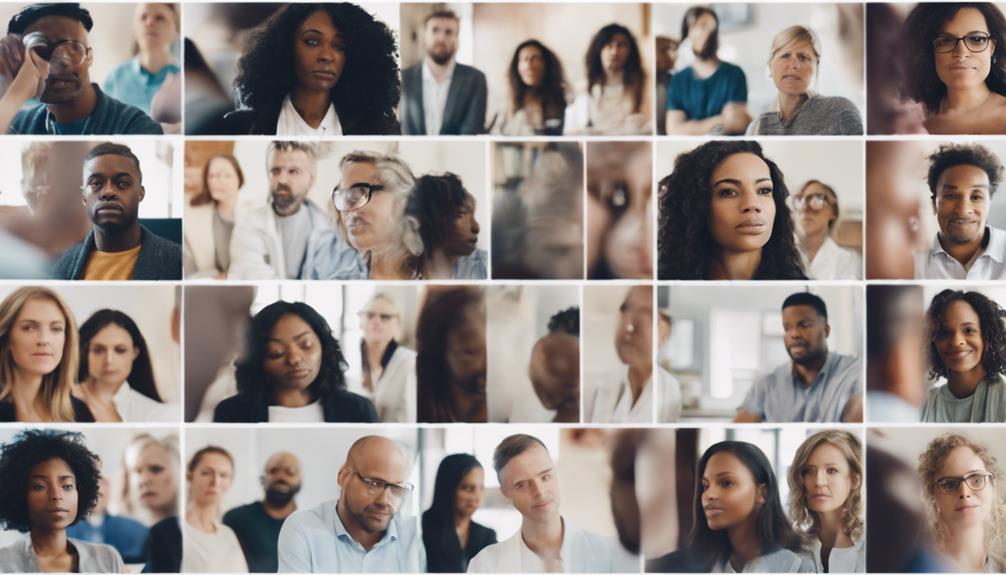In the aftermath of narcissistic abuse, various organizations offer essential support and empowerment for survivors. These groups provide counseling, mental health resources, support groups, helplines, and empowerment programs to aid in self-restoration and reclaiming self-worth. Healing resources, therapy directories, coping strategies, and awareness campaigns are also available to address emotional impacts and promote self-care. Creating safe spaces, advocating for victims' rights, promoting community engagement, and resilience-building activities further assist in recovery and rebuilding self-esteem. Organizations collaborate with mental health professionals and offer tailored treatment to survivors. Valuable resources and tools await for those seeking healing and empowerment.
Key Takeaways
- MyNARA offers support groups and resources for narcissistic abuse survivors.
- Therapy directories connect victims with professional help tailored to their needs.
- Online forums and helplines provide anonymous support and validation.
- Advocacy groups work to raise awareness, provide legal aid, and protect victims' rights.
- Community engagement programs educate about abuse, offer resources, and promote resilience.
Supportive Services Offered by Organizations
We offer extensive supportive services for narcissistic abuse survivors to help them heal and rebuild their lives. Counseling and therapy sessions are available to provide victims with a safe space to process their experiences and work through the trauma caused by narcissistic abuse. Mental health resources are also provided to offer additional support in managing and improving emotional well-being.
Support groups play an essential role in our services, offering survivors the opportunity to connect with others who've experienced similar situations. These groups provide a sense of community and validation, allowing individuals to share their stories and receive empathy and understanding from peers who truly comprehend their struggles.
Helplines and online forums serve as valuable resources for those affected by narcissistic abuse, offering anonymous support and guidance. Victims can access these platforms to seek advice, share concerns, and receive information on how to navigate their healing journey. Our goal is to make sure that survivors feel supported and empowered as they take steps towards recovery and self-restoration.
Empowering Narcissistic Abuse Survivors

Empowering Narcissistic Abuse Survivors focuses on equipping individuals with the tools and support needed to reclaim their self-worth and rebuild their lives after experiencing abuse. This organization provides resources and guidance tailored to those who've encountered the damaging effects of Narcissistic Personality.
By offering empowering programs and events, survivors can learn to recognize and address the impacts of this type of abuse. The goal is to break the cycle of abuse by fostering self-love, healing, and personal growth among survivors.
Through dedicated efforts, Empowering Narcissistic Abuse Survivors aims to assist individuals in breaking free from abusive relationships and creating a life filled with freedom and abundance. By empowering survivors to understand their worth and capabilities, this organization plays an essential role in helping them navigate the aftermath of Narcissistic Personality abuse and move towards a brighter future.
Providing Healing Resources and Tools

We provide a range of healing resources and tools to assist survivors of narcissistic abuse in their recovery journey.
Our therapy directories connect individuals with professionals who specialize in supporting survivors through counseling services.
Additionally, virtual support groups and coping strategies are available to help individuals navigate their healing process.
Therapy for Survivors
In therapy for survivors of narcissistic abuse, specialized support is provided to address the emotional and psychological impacts of the abuse. Mental health providers trained in trauma-informed care help survivors process their experiences and develop coping strategies for healing.
Sessions may include cognitive behavioral therapy, mindfulness techniques, and tailored self-care practices. The goal of therapy for narcissistic abuse survivors is to rebuild self-esteem, set healthy boundaries, and navigate post-traumatic stress. Tools offered aim to empower survivors to reclaim self-worth, trust their perceptions, and cultivate resilience in the face of trauma.
Therapy sessions offer a safe space for survivors to explore their feelings, work through challenges, and move towards healing and recovery with the guidance of a trained professional.
Support Groups Available
Support groups dedicated to helping survivors of narcissistic abuse by providing healing resources and tools offer a supportive environment for individuals to connect and share their experiences. These groups play an essential role in the recovery process by fostering a sense of community and understanding among survivors.
Here are some key benefits of joining a support group:
- Emotional validation and empathy from individuals who've gone through similar experiences.
- Access to valuable information, resources, and coping strategies for dealing with narcissistic abuse.
- Opportunities for personal growth, empowerment, and rebuilding self-esteem in a safe space.
- Peer support and encouragement to navigate the healing journey and overcome challenges together.
Coping Strategies Offered
After exploring the benefits of joining a support group for survivors of narcissistic abuse, understanding the coping strategies offered becomes essential in facilitating healing and empowerment.
The organization provides various coping strategies such as mindfulness, journaling, and self-care practices to aid in the recovery process. Survivors are equipped with tools like boundary setting, assertiveness training, and forgiveness practices to support them on their journey towards healing.
Additionally, support groups and online forums offer a safe space for victims to share experiences, seek validation, and connect with others who understand their struggles.
For those in need of professional support, therapy, counseling, and mental health resources are readily available. Legal aid services are also offered to assist victims in obtaining protection orders, managing legal processes, and seeking justice against their abusers.
Building Awareness and Education Initiatives

Building awareness and educating individuals about narcissistic abuse are essential steps in empowering survivors to heal and thrive. By shedding light on the impact of abuse and providing education, organizations play a crucial role in helping individuals navigate their healing journey.
Here are some key initiatives these organizations undertake:
- Global Awareness Campaigns: These organizations focus on raising awareness on a worldwide scale, emphasizing the detrimental effects of narcissistic abuse.
- Resource Provision: Offering survivors resources and services to understand and address the root causes of attracting harmful relationships is a core focus.
- Promoting Self-Love: A key mission is to provide tools and materials that aid in healing through fostering self-love and self-care practices.
- Supportive Events: Online and in-person events are organized to create a supportive community for survivors, guiding them towards freedom and abundance.
Collaborating with these organizations can be instrumental in helping individuals break free from abusive relationships and move towards a fulfilling life post-abuse.
Creating Safe Spaces for Recovery

Shedding light on the importance of creating safe spaces for recovery for victims of narcissistic abuse is an essential step in fostering healing and empowerment. These spaces provide a supportive environment where survivors can share their experiences, feel validated, and connect with others who understand their pain. By reducing feelings of isolation and shame, safe spaces offer a sense of community pivotal for the recovery journey. Support groups like MyNARA play a significant role in creating platforms for survivors to heal, access resources, and find solidarity in their journey. Online forums and helplines provide anonymous support and guidance, offering a lifeline for individuals seeking help and validation. Additionally, therapy, counseling, and professional medical resources within these safe spaces cater to the specific needs of survivors, ensuring they receive the necessary care and support on their path to healing.
| Benefits of Safe Spaces for Recovery | Services Provided |
|---|---|
| Provides support and validation | Support groups like MyNARA |
| Reduces isolation and shame | Online forums and helplines |
| Builds a sense of community | Therapy and counseling services |
| Offers access to resources for recovery | Professional medical assistance |
| Connects survivors for mutual healing | Tailored services for abuse victims |
Collaborating With Mental Health Professionals

Collaborating with mental health professionals greatly enhances the support available to victims of narcissistic abuse. When victims seek help from therapists, counselors, or psychologists, they gain access to specialized therapy that addresses the complex trauma experienced.
Here are some key ways in which collaborating with mental health professionals can benefit victims of narcissistic abuse:
- Tailored Treatment: Mental health professionals can provide personalized treatment plans that cater to the specific needs of victims, helping them navigate the challenges of narcissistic abuse.
- Healing from Trauma: Access to specialized therapy can aid in the healing process from the long-term effects of narcissistic abuse, allowing victims to work through their trauma in a supportive environment.
- Rebuilding Self-Esteem: Working with experts in trauma recovery can assist victims in rebuilding their self-esteem, empowering them to regain confidence and self-worth.
- Establishing Boundaries: Collaborating with mental health professionals can help victims establish healthy boundaries, equipping them with the tools to protect themselves from further abuse and navigate relationships more effectively.
Advocating for Victims' Rights

Advocating for victims' rights plays an important role in empowering individuals affected by narcissistic abuse to seek justice and protection. Organizations dedicated to this cause work tirelessly to raise awareness about the rights of victims trapped in the cycle of abuse.
These advocacy groups provide essential resources and support to empower victims to take legal action and protect themselves. By collaborating with legal experts, they make sure that victims understand their rights and available options.
Advocates also play a significant role in educating the public and policymakers about the profound impact of narcissistic abuse on individuals and communities. Through promoting victims' rights, these organizations aim to create a safer and more supportive environment for survivors to heal and rebuild their lives.
It's through these efforts that victims of narcissistic abuse can find the strength and support needed to break free from the cycle of abuse and seek the justice and protection they deserve.
Promoting Community Engagement and Support

How can the community actively engage in supporting victims of narcissistic abuse? One way is by recognizing the signs of domestic violence and offering assistance to those in need. By coming together and creating a supportive environment, we can make a significant impact on the lives of those affected.
Here are some practical ways to promote community engagement and support:
- Educate: Spread awareness about narcissistic abuse and its effects on individuals.
- Listen: Be a compassionate listener for those who may be experiencing domestic violence.
- Offer Resources: Share information about organizations like the Narcissistic Abuse Victims Foundation that provide support services.
- Provide Safe Spaces: Create safe and welcoming spaces where victims can seek help without judgment.
Offering Hope and Resilience-building Programs

Offering programs focused on fostering hope and building resilience is essential for organizations supporting victims of narcissistic abuse. These initiatives provide a crucial lifeline for individuals who've experienced the detrimental effects of narcissistic relationships. By offering tools and strategies through resilience-building programs, victims of narcissistic abuse can learn how to overcome the lasting impact of their trauma. These programs empower survivors to rediscover their sense of self-worth and confidence, which are often eroded by the abuse they've endured. Incorporating therapeutic approaches into these programs further aids in the healing process, guiding victims towards a path of recovery and growth.
Through hope-oriented initiatives, organizations aim to instill a positive outlook in victims, helping them believe in a brighter future beyond their past experiences. By focusing on fostering hope and building resilience, these organizations play an essential role in supporting victims of narcissistic abuse on their journey towards healing and reclaiming their lives.
Frequently Asked Questions
What Support Groups Are Available for Recovery From Narcissistic Abuse?
There are various support groups available for recovery from narcissistic abuse. These groups provide a safe space for sharing experiences and receiving support.
Online forums and helplines offer anonymous guidance. Therapy, counseling, and mental health resources aid in the healing journey.
Legal aid services help obtain protection orders and seek justice. Educating oneself about narcissistic abuse is empowering and contributes to healing.
What Organization Helps Victims of Narcissistic Abuse?
We're aware of an organization that truly helps victims of narcissistic abuse! They're the Narcissistic Abuse Victims Foundation. With their dedication, they've supported over 263,961 individuals seeking assistance.
You can reach out to them via email at intake.navf@gmail.com for support and resources. They're committed to addressing the severe consequences of narcissistic abuse on families and individuals.
Plus, privacy policies, terms of service, and a sitemap are available on their website, narcissisticabusevictims.org.
How Do You Prove Narcissistic Abuse in Court?
When proving narcissistic abuse in court, evidence can be presented in various forms such as documented behavior patterns, witness accounts, expert opinions, medical records, and communication records showing abusive behavior. Keeping a detailed journal of abuse instances can establish a pattern, while these proofs help demonstrate the impact of abuse on mental health.
What Is the Best Therapy for Narcissistic Abuse Recovery?
EMDR, CBT, and DBT are effective therapies for narcissistic abuse recovery. Schema therapy, trauma-focused therapy, and mindfulness-based therapy address deep-rooted issues.
Therapists specialized in narcissistic abuse offer tailored treatment plans. Group therapy, support groups, and online options aid healing.
Modalities focusing on self-compassion, self-esteem, and boundaries are beneficial. Survivors can find relief and empowerment through these therapeutic approaches.
Conclusion
In summary, organizations dedicated to helping narcissistic abuse victims offer a range of supportive services, empowerment tools, healing resources, and education initiatives. By creating safe spaces for recovery, collaborating with mental health professionals, advocating for victims' rights, and promoting community engagement, these organizations provide hope and resilience-building programs for survivors.
As the saying goes, 'a problem shared is a problem halved,' these organizations play a vital role in supporting and empowering those affected by narcissistic abuse.










